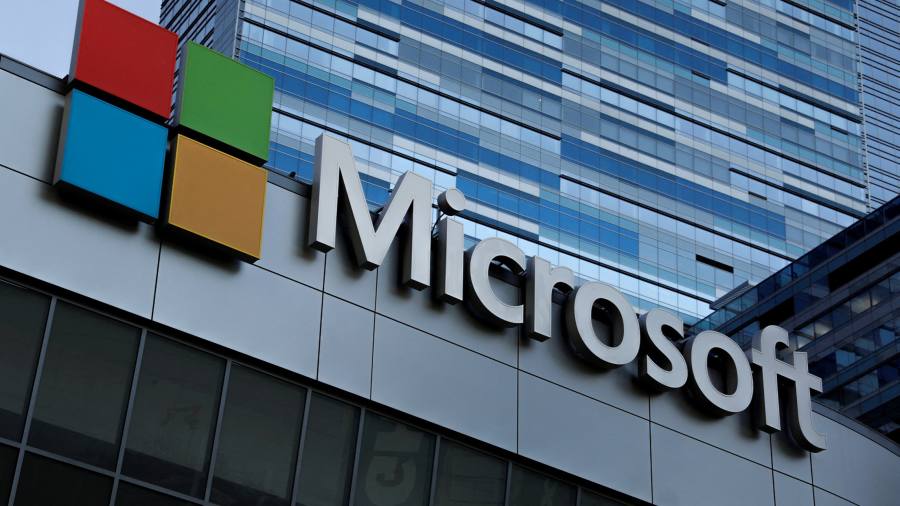Receive free Microsoft Corp updates
We’ll send you a myFT Daily Digest email rounding up the latest Microsoft Corp news every morning.
With a US justice department complaint against Google going to trial next week and Amazon seemingly headed for a showdown with the Federal Trade Commission, it looks like a long-awaited showdown with Big Tech is finally here.
One big tech company, though, has been trying a different approach. Microsoft has made offers to regulators in an attempt to resolve a number of competition concerns, in some cases before they escalate into full-blown investigations.
Last week, it tried to pre-empt an investigation by Brussels into its Teams collaboration app by announcing that it would unbundle the service from its other Office applications in the EU. The week before, in a renewed attempt to win approval in the UK for its $75bn acquisition of Activision Blizzard, it offered to sell its streaming rights to games outside the EU to Ubisoft. This was aimed at resolving worries that it would try to use the rights to monopolise the nascent cloud gaming market.
Microsoft has also been working hard to forestall regulatory action over its cloud licensing practices, which have been a source of unhappiness with some customers since licensing changes made by the company in 2019. The issues are complex, but the dispute essentially boils down to the way the company has used its existing software licences to nudge customers into buying its own cloud services, rather than opting for rivals such as Amazon or Google.
Last year Microsoft admitted that its critics had some “valid concerns” (a rarity from one of the biggest tech companies) and promised changes — though that has not silenced the complaints or prevented growing regulatory scrutiny.
Seen from one perspective, Microsoft’s concessions look welcome. If a big tech company acts early to deal with competition worries, then there is no need to wait years for regulators to catch up with the problem.
Yet rivals claim the voluntary moves are less than they seem. They accuse the company of offering half-measures, of misdirection to take attention away from more serious misdeeds, and in some cases of only acting when the damage has already been done.
Some of Microsoft’s concessions look clear-cut. By offering to sell its cloud streaming rights to games, it is leaving it to Ubisoft to decide later on how to commercialise these properties, effectively putting the rights at arm’s length.
The offer will not prevent Microsoft itself getting into cloud gaming — it can pay Ubisoft for a commercial licence, like anyone else. And it will not stop Microsoft being one of the biggest winners from the new market, making profits as the wholesaler of cloud games sold through Ubisoft. Critics grumble this means the software company has not really given anything up. But, provided the CMA accepts the arm’s length nature of the arrangement, it should neatly deal with worries about future abuse.
However, the concession over Teams seems woefully late. Microsoft first bundled Teams with Office nearly seven years ago. It was seen at the time as an aggressive ploy to outflank Slack, on a par with the way it bundled its first internet browser into Windows to defeat browser pioneer Netscape.
Microsoft earlier this year said more than 300mn people use Teams at least once a month, meaning the damage has already been done and unbundling comes too late to prevent the market tipping in its favour. Nonetheless, the company has at least acted before having its arm twisted by Brussels, while at the same time opening itself up to other regulators around the world, who will now be pressing for similar concessions.
By comparison with its compromises over Activision and Teams issues, Microsoft faces a much tougher challenge in dealing with the complaints over cloud licensing. Research carried out for CISPE, a European cloud computing industry group, claims to show Microsoft has squeezed billions of extra dollars out of its customers through its licensing terms.
Brussels has been the first to dig into this issue, but other regulators are also starting to show interest. The FTC in the US and the Competition and Markets Authority in the UK have held open consultations on cloud licensing, leading rivals such as Google to complain loudly about how Microsoft behaves.
Microsoft has done a good job recently of staying out of the regulatory spotlight. But the gathering concerns over cloud licensing, which go to the heart of its most important business, are not something it will be able to sidestep easily.
Read the full article here




